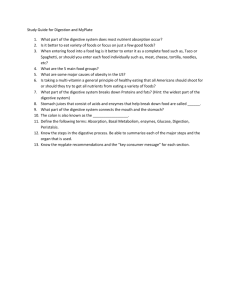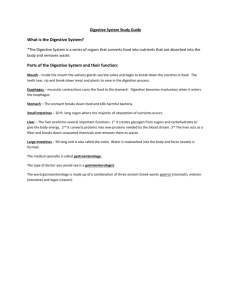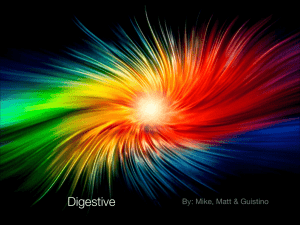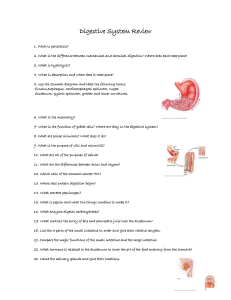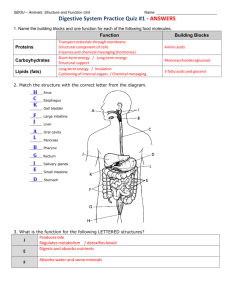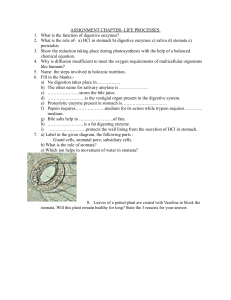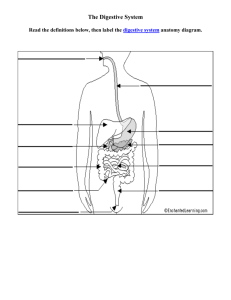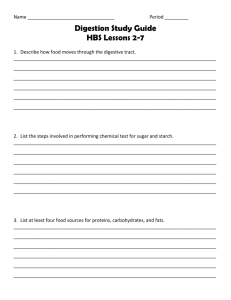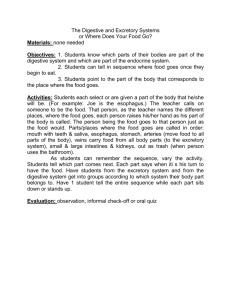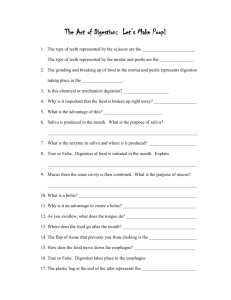Care & Problems of the Digestive System
advertisement
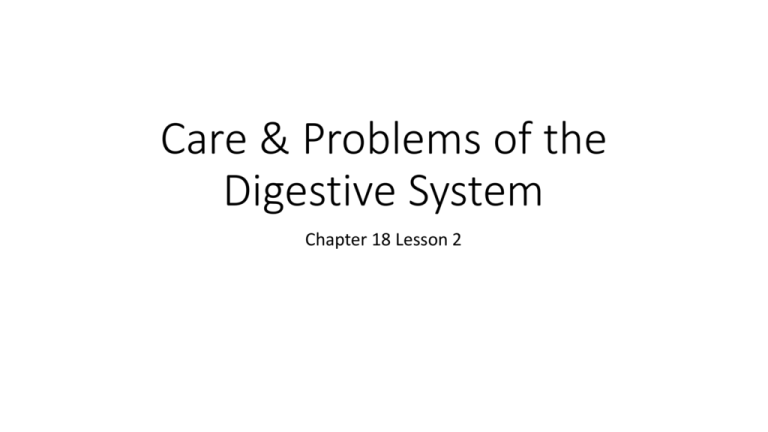
Care & Problems of the Digestive System Chapter 18 Lesson 2 What are some minor disorders of the digestive system? What are some minor disorders of the digestive system? • Halitosis • Indigestion • Heartburn • Flatulence • Nausea • Diarrhea • Dehydration • Constipation Health Terms • Indigestion • Hiatal hernia • Appendicitis • Peptic ulcer Health Concepts • The health of the digestive system depends in large part on healthful eating habits. • The more you chew your food, the easier it is on your digestive system. Care of the Digestive System • • • • • Eat a variety of foods Avoid an overabundance of fried/greasy foods. Choose foods low in fat, high in fiber. Eat slowly. Do not wash food down with liquid. Wait until you are finished chewing – swallow, and then take a sip of drink. • Drink plenty of water (6-8 glasses/day). Your digestive system needs a lot of water to do its job properly. • Limit intake of carbonated beverages. • Avoid eating as a result of stress. Problems of the Digestive System • Indigestion • Heartburn • Gas • Nausea • Diarrhea • Constipation Indigestion • Burning discomfort in the upper abdomen.* • Often accompanied by buildup of gas and nausea. • Results from eating too much, eating too quickly, eating certain foods, stomach disorders, or stress. • To prevent = avoid eating foods that in the past have caused you discomfort, eat slowly, and avoid eating under stress. Heartburn • Burning pain in the center of the chest that may travel from the tip of the breastbone to the throat. • HAS NOTHING TO DO WITH YOUR HEART • Caused by acid reflux, a backflow of stomach acid in the esophagus. • Occurs if the sphincter muscle at the end of the esophagus does not close tightly. • Stomach acids cause the burning sensation in esophagus. • Heartburn may be a symptom of a hiatal hernia, a condition in which part of the stomach pushes through an opening in the diaphragm.* Gas • A certain amount in the stomach or intestines is normal. • Excessive amounts can cause a great deal of discomfort. • Certain foods such as cooked onions and heavily spiced dishes seem to be gas-producing for many people. Nausea • Feeling of distress, fullness, and weakness and often precedes vomiting. • Can be caused by motion, pathogens, medicines, drugs, or other substances in the stomach. • Vomiting is a reflex response that provides a built-in protection if you swallow a foreign substance. • Vomiting is the result of revers peristalsis in the stomach and esophagus. Diarrhea • Condition in which the feces are watery and expelled frequently. • If food passes through the large intestine too fast, water cannot be absorbed, and diarrhea results. • Causes: change in eating style, food poisoning, overeating, emotional turmoil, and nutritional deficiencies, viral/bacterial infections. • To avoid dehydration, it is important to replace water and electrolytes. • Clear up when cause is eliminated. Constipation • Feces become dry and hard. • Bowel movements are difficult. • Feces stay in the large intestine too long will have too much water absorbed from them. • Causes: lack of fiber, erratic eating habits, drinking too little water, lack of exercise. • Laxative drugs may be useful in clearing up constipation. • Using laxatives too often can cause digestive problems with vitamin absorption in the large intestine and the body may become dependent on them and fail to function normally. Only use as needed.* Structural Digestive System Problems • Gallstones • Appendicitis • Gastritis • Lactose Intolerance • Peptic Ulcer • Colitis • Hemorrhoids • Tooth Decay Gallstones • Small crystals that form in the gallbladder when an upset occurs in the chemical composition of the bile. • They can black the bile duct between gallbladder and duodenum (small intestine), causing pain. • Gallstones can be treated with medicine to dissolve them , or they can be shattered by ultrasound-guided shock waves.* • Surgical removal is only used in extreme cases. Appendicitis • The inflammation of the appendix. • 3 to 4 inch extension at one end of the large intestine. • When bacteria or other foreign material lodges in the appendix, the closed end beyond the blockage becomes swollen and puss filled. • If the appendix ruptures, the infection spreads into the abdomen, which is extremely dangerous. • Symptoms of appendicitis include, pain and cramps in the bottom right of abdomen, fever, loss of appetite, nausea, and vomiting. • Medical care is essential! Treatment is removal of appendix. Gastritis • One of the most common disorder of the digestive system. • Inflammation of the mucous membrane that lines the stomach. • Causes: irritation to stomach lining from foods, aspirin, tobacco smoke, or alcohol. • Symptoms: pain in upper abdomen, nausea, vomiting. • Antibiotics may be prescribed if the cause is bacteria related. • Acid controlling medication that “coats” the stomach lining may also be prescribed. Lactose Intolerance • Lactose is a sugar in milk. • For the body to digest it must be broken down by lactase (small intes). • Some people have a deficiency in lactase, resulting in lactose intolerance. • Undigested lactose causes cramps, diarrhea, bloating, and gas. • Do not eat dairy products. Peptic Ulcer • A sore in the lining of the digestive tract. • Can occur in esophagus, stomach, or duodenum. • Stomach lining is constantly at risk from stomach acids. • Increased risk: aspirin, ibuprofen, smoking, infection. • Symptoms: gnawing pain in abdomen when stomach is empty. • Without treatment, ulcers my perforate, or break through, the stomach wall. • Treatment: medicines that neutralize or reduce stomach acids. Colitis • Inflammation of the colon/LI.* • Causes: virus or bacteria. • Symptoms: diarrhea, abdominal pain, and sometimes fever. • The cause of ulcerative colitis (pictured) is unknown. • Treatment: medicine can control but not cure. Hemorrhoids • Swollen veins in the lower rectum and anus* • Result of increased pressure in the veins of the anus • Common in people with constipation or who sit a lot, pregnant women, and following childbirth • Itching, pain, and bleeding are signs of hemorrhoids • Regular exercise and eating fiber-rich foods can help reduce your risk of developing hemorrhoids. Tooth Decay • Surprised? • Part of the digestive system • Tooth decay weakens a tooth and affects the way a person bites and chews food. • Yet another reason to take care of your teeth! Questions (pg 423: 1-4) 1. 2. 3. 4. Why is fiber so important to the health of your digestive system? What are some of the causes of indigestion? What makes tooth decay a problem of the digestive system? How do nutrition and exercise contribute to the prevention of many common digestive system disorders? 5. Summarize each of the digestive disorders detailed in this lesson.
